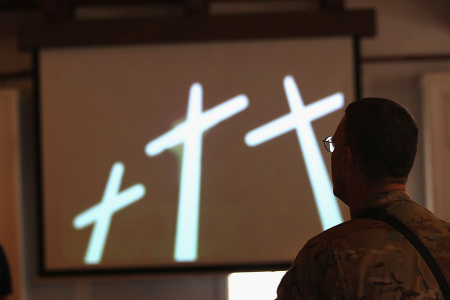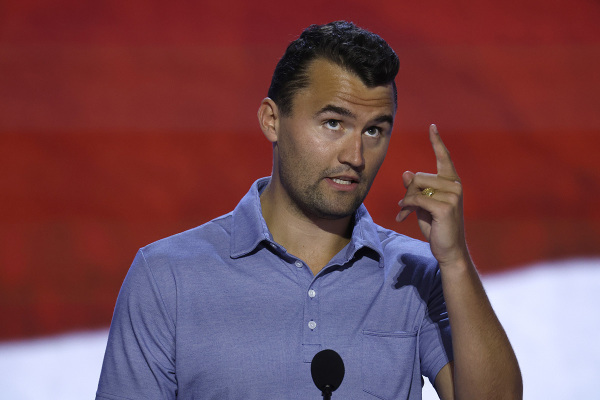Collins' amendment aims to protect military service members' right to worship

A new amendment has been introduced to the National Defense Authorization Act for the fiscal year 2021 that seeks to protect the religious freedom rights of service members amid the coronavirus pandemic.
The amendment proposed by Rep. Doug Collins, R-Ga., the only military chaplain serving in the 116th Congress, would prevent the Department of Defense from issuing any “guidance, order, or regulation” restricting service members’ attendance at religious services or gatherings “if similar guidance does not exist for other gatherings.”
“This amendment will guarantee that our men and women in uniform are able to freely exercise the very freedoms they fight to protect each and every day,” Collins, a lieutenant colonel in the U.S. Air Force Reserve who is also a candidate for U.S. Senate, said in a statement
The amendment comes after the U.S. Navy issued an order that critics said banned troops from attending indoor religious services during the pandemic but allowed them to gather at house parties.
The Navy ultimately clarified its guidance last week, stressing that in-person worship is now permissible as long as measures are taken to curb the spread of COVID-19.
Collins applauded the decision.
“While we can all agree that the health and safety of our troops is critical during the ongoing public health crisis, singling out religious gatherings while allowing other activities and unrestricted social gatherings to take place is unlawful,” Collins said.
Collins, along with Rep. Doug Lamborn, R-Colo., sent a letter to Defense Secretary Mark Esper on July 1, demanding a meeting with him and other military officials by the end of the month. The lawmakers want to “discuss the steps that need to be taken to protect the religious freedom of our service members.”
The lawmakers voiced concerns about the “mixed messages” they have received from Pentagon officials over the past month.
They also expressed concerns over the actions taken by military officials in response to complaints from the Military Religious Freedom Foundation, a secular legal organization that often pressures the military branches to enforce a strict separation of church and state.
“Given the years-long record of the DoD’s actions in contradiction with federal law protecting religious liberty, it is clear to us that the DoD has either willfully ignored or is unaware of its obligations to protect the religious freedom of its service members,” the lawmakers said in the letter.
“Despite the several letters members of Congress, legal organizations, and faith groups have sent the DoD explaining its obligations, we continue to witness failures to correctly apply Federal law protecting the religious freedom of our brave men and women in the military.”
The lawmakers demanded explanations of the “comprehensive policies and training concerning religious freedom” the Army mentioned in a June letter to the members of Congress, the decision-making process regarding the military’s response to MRFF complaints, and the Navy’s recent order on worship services.
Sen. Ted Cruz, R-Texas, also wrote a letter to Esper on June 9 asking him to protect religious freedom within the Defense Department. Cruz’s letter came amid reports that the Army has censored military chaplains and hampered their ability to provide religious services during the coronavirus pandemic.
“Unfortunately, DOD and the Army have been hindering chaplains' efforts to send messages of hope and faith through a series of extremely concerning infringements on military chaplains' free exercise rights,” Cruz wrote in his letter. “We write to urge you to ensure that DOD complies with the religious freedom mandates of the Constitution and to ask you to issue clear guidance that strongly protects religious freedom within the DOD.”
This week, Cruz introduced language into the Senate version of the National Defense Authorization Act that would require that the Religious Freedom Restoration Act be taught to all commanders, chaplains and judge advocates, according to The Military Times.
Efforts among House Republicans to secure religious freedom for service members began two months ago, when a group of 20 lawmakers, including Collins and Lamborn, wrote a May 14 letter to Esper urging the Pentagon to stand up for the religious liberty of Christian service members in the wake of criticism from MRFF.
MRFF issued a series of complaints about the public expressions of religion by military chaplains.
One of the incidents the lawmakers’ letter touched on included that of Col. Moon H. Kim, who serves as the senior chaplain at U.S. Army Garrison Humphreys in South Korea. Kim sent an email to nearly three dozen of his chaplain colleagues that included the PDF of a John Piper book called Coronavirus and Christ.
That did not sit well with the MRFF, which demanded action in response to Kim’s email suggested he should be court-martialed.
After mentioning that Kim was “being subject to a review that could harm his career and reputation,” the members of Congress maintained that Kim “should not and cannot be disciplined for his email.”
The lawmakers also opposed the removal of Facebook videos featuring military chaplains either encouraging service members to engage in prayer or offering “a simple message of encouragement.” The videos were subsequently removed in response to MRFF's complaints.
“I’m always very surprised when we see military commanders immediately jumping through hoops whenever the MRFF contacts them. And for whatever reason, when we raise issues of religious liberty, they have a tendency to want to fight us for a while,” Hiram Sasser, an attorney at the First Liberty Institute, a legal group that defends the First Amendment rights of service members, told The Christian Post.
“I don’t know if that’s just happenstance or if for some reason, the leadership of the Pentagon is more sympathetic to the Military Religious Freedom Foundation. But for whatever reason, the Department of Defense seems to respond very, very favorably to that organization. We usually have to fight really hard in order to get our victories.”
Throughout the May 14 letter, the concerned lawmakers referred to guidance released by the Army Chaplain Corps on the publicization of religious or spiritual content via social media. This guidance gives the Army Chaplain Corps “broad latitude to use diverse means of social media to broadcast religious services, messages, and educational materials.”
The guidance also prohibits the Army from instituting “content-based restrictions on religious speech absent a ‘compelling government interest.’”
“Army policy does not prohibit ‘evangelizing’ or ‘proselytizing’… so long as they are communicated in a manner avoiding appearance of official Army/DoD endorsement or promotion of the particular religious viewpoint or group,” the guidance states.
The MRFF also sent a complaint demanding that Lt. Col. David McGraw face “punishment” for hosting “Sunday Christian Porch Preaching” from the balcony of his apartment building at U.S. Army Garrison Stuttgart, Germany for several weeks.
After the MRFF complaint, McGraw apologized to residents of Kelley Barracks for holding Sunday worship services from his military housing balcony.
The members of Congress argued that “Lt. Col. McGraw should be allowed to continue his Sunday morning preaching and hymn-singing immediately.”
Reacting to the Navy’s move to allow service members to attend indoor services, Sasser said it's “important to give the Navy credit.”
Sasser said that when First Liberty raised the issue, the Navy “took it seriously and they had some good people at the top.”





















